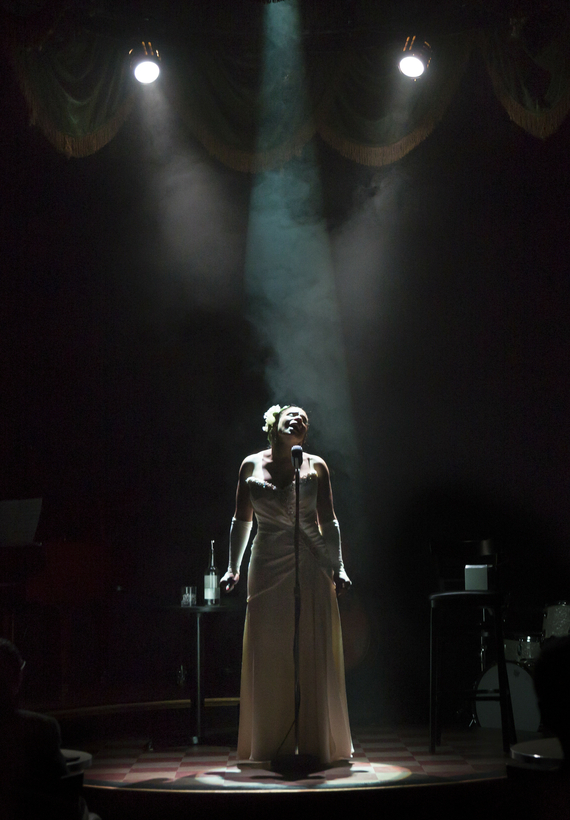Lady Day at Emerson’s Bar & Grill mimics cabaret, but make no mistake—this is drama. Onstage virtually without interruption over a span of 90 minutes, Audra McDonald lives and breathes the abused, drug-addicted Billie Holiday. Once the toast of Carnegie Hall, now a self-styled “jailbird” marking time in a dive in Philadelphia, Holiday would die of cirrhosis at Manhattan’s Metropolitan Hospital just four months later, on July 17, 1959. Strapped to her leg were 15 $50 bills (the last cash she had), intended for the nurses. Narcotics agents were hovering at the door. She was 44.
“Singing is living for me,” Holiday says early in the evening. “Let the song find me.” Even if it means club owners won’t pay her if she skips “God Bless the Child” and “Strange Fruit,” she can’t sing what she’s not feeling. When the time comes, McDonald delivers those numbers and nearly a dozen more in context and in character. Of the record-breaking six Tony Awards in all four applicable categories that crowd her mantlepiece, the one for Lady Day at Emerson’s Bar & Grill in 2014—her latest—is for best actress in a play.
There’s no overstating Holiday’s stature in American music. The year before she died, Frank Sinatra told Ebony magazine: “It is Billie Holiday who was, and still remains, the greatest single musical influence on me. Lady Day is unquestionably the most important influence on American popular singing in the last twenty years.”
Rather than dwell on her place in the canon, the playwright Lanie Robertson brings back the protagonist of Holiday’s scathingly frank memoir, Lady Sings the Blues, sketching with remarkable efficiency her abuse by the men in her life, the insults of racists, the harassment by law enforcement. For cathartic comic relief, there’s a vignette from her days on the road with Artie Shaw and his band, white colleagues who voluntarily entered clubs by the kitchen door when owners refused to admit Holiday by the front door—or to let her use the powder room.
McDonald’s Lady Day has been documented in full before live audiences on two occasions. From the Broadway run of the play, there’s a two-CD album on PS Classics. The film version was captured at the Café Brasil, New Orleans, in 2016. The audio version constitutes a fully realized performance in its own right.
In dialogue and in song, McDonald’s lush soprano with its striking kittenish and husky inflections is riveting. Still, you’ll want to see the way she hangs her head, the way she fills a glass or gets smooched by her Chihuahua; her cliff-hanger missteps at the lip of the stage will stop your breath. Most of all, it’s the close-ups that linger, those Sphinx-like yet transparent eyes registering waves upon swells of oceanic emotion. At the close of “Strange Fruit,” her features morph into a living mask of tragedy that on its own is worth the price of admission.
Lady Day at Emerson’s Bar & Grill is available for streaming on the BroadwayHD
Matthew Gurewitsch writes about opera and classical music for AIR MAIL. He lives in Hawaii

